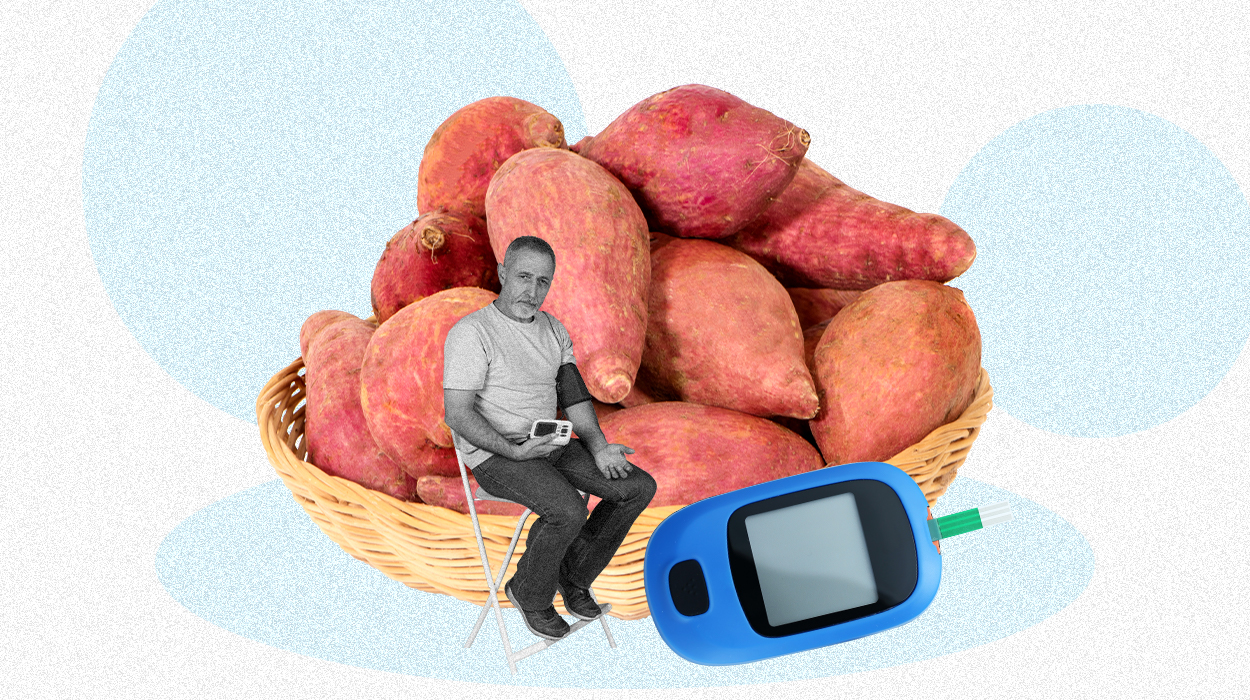 Expert's opinion
Expert's opinion
Expert's opinion
The article is a subjective view on this topic written by writers specializing in medical writing.
It may reflect on a personal journey surrounding struggles with an illness or medical condition, involve product comparisons, diet considerations, or other health-related opinions.
Although the view is entirely that of the writer, it is based on academic experiences and scientific research they have conducted; it is fact-checked by a team of degreed medical experts, and validated by sources attached to the article.
The numbers in parenthesis (1,2,3) will take you to clickable links to related scientific papers.
Is Sweet Potato Good For Diabetes In 2024? Nutrition Facts & Risks

Sweet potatoes are extremely nutritious and are widely available throughout the world. The root tuber is popular because it is sweet, filling, and nutrient-rich. While sweet potato may be good for diabetes, you must consume it in moderation, as eating just half of a medium sweet potato is considered a starch exchange in the diabetes diet. Consider consumption patterns, methods of preparation, and other accompanying foods to determine overall glycemic management.
Most sweet potatoes have a medium-high glycemic index of 62-70 meaning they significantly affect blood sugar levels. However, they can be incredibly satisfying and filling. But, consuming this carbohydrate mindlessly can be disastrous for your blood sugar. Furthermore, current evidence indicates[1] that more research needs to be done to verify the benefits of sweet potatoes in diabetes.
So, are sweet potatoes good for those with diabetes? Check out this comprehensive guide to learn about our current knowledge about sweet potatoes’ benefits, risks, and the best preparation methods.
Is Sweet Potato Good For Diabetes?
Sweet potato is thought to be good for diabetes patients. It has the following known advantages:
- It provides vitamins and minerals to the body.
- It provides a long-lasting sense of satisfaction due to its high fiber content.
- It aids in regulating insulin production, storage, and secretion.
- It aids in treating hyperglycemia[2].
Sweet potato must be adequately prepared and consumed with proper hydration in appropriate portions; otherwise, it can increase the risk of kidney stones, hyperkalemia, and vitamin A toxicity.
Sweet Potatoes Nutrition Facts
Can diabetics eat sweet potatoes? Sweet potatoes are a nutritious food widely regarded as a good choice for people with diabetes. It is especially recommended for people with type 2 diabetes because it upregulates the glucose transporters that reduce insulin resistance[3] and stabilizes blood sugar levels. In addition, sweet potatoes are high in:
Vitamins
Sweet potato is high in vitamin A, vitamin B6, and vitamin C, all of which are important for diabetes control. Vitamin A is a powerful antioxidant.[4] It also aids in energy balance during homeostasis.
Vitamin B6 aids in the treatment of glucose intolerance,[5] particularly in women with gestational diabetes. It effectively assists people with glucose intolerance to reduce their chances of developing complications. Vitamin C is a potent antioxidant that protects the body from oxidative stress, and diabetes is a disease associated with high oxidative stress.
Potassium
Potassium is a mineral and an electrolyte. It carries a small electric charge that aids nerve function and the activities of various body tissues. It is crucial for diabetes because it promotes proper kidney function,[6] insulin release, and blood sugar metabolism.
Diabetes is a leading cause of kidney disease and damage. Eating sweet potatoes prevents low potassium levels associated with muscle weakness, abnormal heart rhythms, and other potentially fatal symptoms associated with diabetes complications and declining kidney function.
Magnesium
Magnesium is a mineral that is necessary for many bodily functions. According to research, magnesium helps stabilize glucose levels[7] after meals, which is necessary for proper muscle and nerve function.
Magnesium is essential for energy metabolism, blood pressure control, and, most importantly, blood sugar regulation. It also improves insulin sensitivity[8] in people with type 2 diabetes.
Zinc
Zinc is an essential mineral that aids in various bodily functions, including disease prevention and wound healing. Some studies suggest a link between zinc deficiency,[9] poor glycemic control, and type 2 diabetes. The mineral is involved in insulin production, storage, and secretion.
Fiber
Orange sweet potatoes are high in fiber, which helps regulate blood sugar levels[10] and promote overall health. Fibre is important for people with diabetes because it slows the absorption of carbohydrates in the digestive system, reducing the likelihood of blood sugar spikes. A sweet potato serving size (one-half of a medium potato) contains about 2-3.5 grams of dietary fiber, contributing significantly to a day’s goal [11] of 25-38 grams.
How Can Sweet Potatoes Impact Blood Sugar?
Sweet potato is a carbohydrate widely used in various communities as a functional food. So, is sweet potato good for type 2 diabetes? Yes, sweet potato influences blood sugar levels through the following:
Lower Glycemic Index Than White Potatoes
Boiled sweet potatoes have a medium glycemic index[12] of 62, which means they cause a moderate rise in blood sugar levels. This is compared to the GI of white potatoes, which is a whopping 84! Sweet potatoes are, thus, lower in glycemic index than white potatoes and will cause less of a blood sugar spike than white potatoes. However, as you can see, you will still want to watch your serving size of sweet potatoes due to their somewhat medium-high glycemic index — and you might want to choose them over white potatoes in a meal.
Vitamin And Mineral Content
Sweet potato is good for diabetes because it contains vitamins that help people with diabetes stay healthy. Vitamin A, for example, aids in gene regulation [13] which promotes insulin release by influencing the expression of genes that regulate insulin sensitivity. The B vitamins and minerals also help the body fight diabetes and its complications.
Amount Per Serving
Sweet potato contains starch and affects blood sugar levels. The extent of the effect, however, is determined by the amount consumed in each serving, the type of sweet potato, and how it’s prepared. An important query is how much sweet potato one should eat daily. The amount of sweet potato served should be at most half a kilogram,[14] according to USDA — but this is far too much to consume in a day to maintain stable blood glucose in diabetes.
Still, according to the diabetes meal plan, half a medium sweet potato is one starch serving, and half of a small cooked sweet potato weighs about 2 ounces. Eat sweet potatoes in moderation to enjoy their full benefits if you have diabetes.
Side Dishes Served With Sweet Potato
You can consume sweet potatoes as a main course or as a snack. They can be served with a side dish that does not cause a spike in blood sugar levels. Green vegetables and fried eggs are two of the best side dishes for sweet potato meals.
Benefits Of Sweet Potatoes For Diabetes
People with diabetes can control their blood sugar and associated symptoms with sweet potatoes in various ways, including:
Essential Nutrients
Each serving boosts essential nutrients. Sweet potatoes provide diabetes patients with vitamin C, which boosts their immunity. The food is also high in provitamin A carotenoids, a good vitamin A source. Patients with diabetes should regularly consume vitamin A to promote good eye health and lower the risk of eye damage[15] associated with the condition.
Fiber And Protein’s Satiating Properties
Orange sweet potatoes’ high fiber and protein content can help people with diabetes feel fuller for longer periods. It reduces the risk of overeating and assists in weight management. Fiber, like some supplements for diabetes, promotes satiation, reduces appetite, and, ultimately, reduces the risk of overeating.
May Be A Healthy Alternative To Higher Glycemic Index Foods
Purple sweet potatoes have a higher glycemic index than orange sweet potatoes [16]at 83.5 and are a poor alternative to orange sweet potatoes at a GI of 62-70 for people with diabetes. The glycemic index associated with purple sweet potatoes is similar to white potatoes, so choose the orange variety for meals.
Risks Of Eating Sweet Potatoes
Sweet potatoes are generally considered healthy even though they are starchy vegetables. However, some risks exist for people who eat sweet potatoes in excess. So, is sweet potato good for diabetes patients and glucose control? Some of the risks associated with eating sweet potatoes include:
Kidney Stones
Japanese sweet potatoes contain a lot of oxalates. While oxalates are naturally occurring and safe, their buildup in the body increases the risk of kidney stones.[17] Diabetes patients are more likely to develop kidney stones from oxalates or calcium due to insulin resistance. Insulin resistance increases the risk of calcium stone formation in the kidneys and nephrolithiasis (stone formation) in men.[18]
Diabetes makes it harder for the kidneys to secrete ammonium, making the urine acidic. This process is aggravated by insulin resistance in both sexes with diabetes. A high fluid intake is the best preventative strategy, with a goal of about 3 L of water per day.
Elevated Potassium Levels
Sweet potatoes are high in potassium and can help people with diabetes manage their blood sugar levels. However, if consumed excessively, cooked sweet potatoes can cause harmful potassium levels[19] and related complications such as muscle weakness and irregular heartbeats.
Stomach Problems
Mannitol, a carbohydrate associated with stomach pain, is found in sweet potatoes. Excessive food consumption can increase the likelihood of stomach discomfort, especially in sensitive people.
Vitamin A Toxicity
All varieties of sweet potatoes are high in vitamin A, so overeating them can cause toxicity.[20] Vitamin A toxic people experience systemic discomfort, particularly headaches and skin rashes. Partial hair loss, cracked lips, dry skin, and liver damage can become a problem if you eat sweet potatoes in excess.
How To Prepare Sweet Potatoes If You Have Diabetes

The root tuber’s suitability is determined by how well it is prepared. People with type 2 diabetes should exercise caution when preparing sweet potatoes to avoid spiking blood sugar levels. The most common and best way to prepare sweet potatoes is to boil them. Boiling also retains more fiber, slowing digestion for a longer period of satiety and maintaining a lower glycemic index.
Boiled sweet potatoes have a GI of 62, whereas baked sweet potatoes have a GI of 70. Thus, baking is less healthy for blood sugar management than boiling or steaming. Roasting and baking, for example, are linked to the destruction of resistant starch, resulting in a higher glycemic index.
And frying in one study was associated with a lower GI of 47, the lowest of all cooking methods for sweet potatoes. But frying adds unnecessary fat and calories that may affect blood sugar control in other ways. Furthermore, other research contradicted this low value and showed the highest GI value for fried sweet potatoes of all the cooking methods.[23] Clearly, more research needs to be done to gain consistent results on the effect of preparation methods on the glycemic index.
The Bottom Line
Sweet potatoes in appropriate serving sizes are still a fantastic choice for those with diabetes. Sweet potato provides a proportionate amount of nutrients when properly prepared and served. This superfood also keeps people full, preventing them from eating impulsively.
Various studies show that adequately blending sweet potato with other powerful edibles, such as protein powder, can be beneficial. It aids in developing compounds capable of increasing sweet potato’s nutrient content while lowering the risks associated with the traditional delicacy’s consumption. And paying attention to how you cook this delicious vegetable plays a vital role in blood sugar management. In proper portions, cooked appropriately, and combined with other glycemic-friendly foods, sweet potatoes can be enjoyed by those with diabetes without worrying about upsetting blood sugar control.
+ 20 sources
Health Canal avoids using tertiary references. We have strict sourcing guidelines and rely on peer-reviewed studies, academic researches from medical associations and institutions. To ensure the accuracy of articles in Health Canal, you can read more about the editorial process here
- Cheow Peng Ooi and Seng Cheong Loke (2013). Sweet potato for type 2 diabetes mellitus. The Cochrane library, [online] 2013(12). doi:https://doi.org/10.1002/14651858.cd009128.pub3.
- Naomi, R., Hasnah Bahari, Muhammad Dain Yazid, Othman, F., Zainul Amiruddin Zakaria and Mohd Khairi Hussain (2021). Potential Effects of Sweet Potato (Ipomoea batatas) in Hyperglycemia and Dyslipidemia—A Systematic Review in Diabetic Retinopathy Context. International Journal of Molecular Sciences, [online] 22(19), pp.10816–10816. doi:https://doi.org/10.3390/ijms221910816.
- Lie‐Fen Shyur, Varga, V., Chiao Ming Chen, Shu Chi Mu, Yevvon Yi-Chi Chang and Sing Chung Li (2021). Extract of white sweet potato tuber against TNF-α-induced insulin resistance by activating the PI3K/Akt pathway in C2C12 myotubes. Botanical Studies, [online] 62(1). doi:https://doi.org/10.1186/s40529-021-00315-8.
- Neela Satheesh and Solomon Workneh Fanta (2019). Review on nutritional composition of orange‐fleshed sweet potato and its role in management of vitamin A deficiency. [online] 7(6), pp.1920–1945. doi:https://doi.org/10.1002/fsn3.1063.
- Stach, K., Stach, W. and Katarzyna Augoff (2021). Vitamin B6 in Health and Disease. [online] 13(9), pp.3229–3229. doi:https://doi.org/10.3390/nu13093229.
- Weaver, C.M. (2013). Potassium and Health. [online] 4(3), pp.368S377S. doi:https://doi.org/10.3945/an.112.003533.
- Barbagallo, M. and Dominguez, L.J. (2015). Magnesium and type 2 diabetes. [online] 6(10), pp.1152–1152. doi:https://doi.org/10.4239/wjd.v6.i10.1152.
- Liu, H., Li, N., Jin, M., Miao, X., Zhang, X. and Zhong, W. (2020). Magnesium supplementation enhances insulin sensitivity and decreases insulin resistance in diabetic rats. [online] 23(8), pp.990–998. doi:https://doi.org/10.22038/ijbms.2020.40859.9650.
- Farooq, D.M., Alamri, A., Alwhahabi, B.K., Ashraf Metwally and Kareem, K. (2020). The status of zinc in type 2 diabetic patients and its association with glycemic control. [online] 27(1), pp.29–29. doi:https://doi.org/10.4103/jfcm.jfcm_113_19.
- McRae, M.P. (2018). Dietary Fiber Intake and Type 2 Diabetes Mellitus: An Umbrella Review of Meta-analyses. [online] 17(1), pp.44–53. doi:https://doi.org/10.1016/j.jcm.2017.11.002.
- Tips to Increase Dietary Fiber. (n.d.). Available at: https://www.nutrition.va.gov/docs/UpdatedPatientEd/TipstoIncreaseDietaryFiberNov2019.pdf#.
- Siti Nurdjanah, Samsu Udayana Nurdin, Sussi Astuti and Manik, V. (2022). Chemical Components, Antioxidant Activity, and Glycemic Response Values of Purple Sweet Potato Products. [online] 2022, pp.1–11. doi:https://doi.org/10.1155/2022/7708172.
- Yang, F.-C., Xu, F., Wang, T. and Chen, G. (2021). Roles of vitamin A in the regulation of fatty acid synthesis. [online] 9(18), pp.4506–4519. doi:https://doi.org/10.12998/wjcc.v9.i18.4506.
- Usda.gov. (2023). Sweetpotatoes Grades and Standards | Agricultural Marketing Service. [online] Available at: https://www.ams.usda.gov/grades-standards/sweetpotatoes-grades-and-standards.
- Shah, J., Zi Yu Cheong, Tan, B., Wing, D., Liu, X. and Chua, J. (2022). Dietary Intake and Diabetic Retinopathy: A Systematic Review of the Literature. Nutrients, [online] 14(23), pp.5021–5021. doi:https://doi.org/10.3390/nu14235021.
- Siti Nurdjanah, Samsu Udayana Nurdin, Sussi Astuti and Venni Elsa Manik (2022). Chemical Components, Antioxidant Activity, and Glycemic Response Values of Purple Sweet Potato Products. International journal of food science, [online] 2022, pp.1–11. doi:https://doi.org/10.1155/2022/7708172.
- Mitchell, T., Kumar, P., Reddy, T., Wood, K., Knight, J., Assimos, D.G. and Holmes, R.P. (2019). Dietary oxalate and kidney stone formation. [online] 316(3), pp.F409–F413. doi:https://doi.org/10.1152/ajprenal.00373.2018.
- Kim, S., Chang, Y., Hyun Suk Jung, Young Youl Hyun, Lee, K., Kwan Joong Joo, Heung Jae Park, Cho, Y., Ko, H., Sung, E., Shin, H. and Ryu, S. (2020). Glycemic Status, Insulin Resistance, and the Risk of Nephrolithiasis: A Cohort Study. American Journal of Kidney Diseases, [online] 76(5), pp.658-668.e1. doi:https://doi.org/10.1053/j.ajkd.2020.03.013.
- Yanagihara, C., Teru Kumagi, Tasaka, T., Watanabe, Y., Kono, T., Kiyotaka Ohshima and Akiyoshi Ogimoto (2022). Potentially Life-threatening Arrhythmia Triggered by an Excessive Consumption of Dried Sweet Potato ‘Hoshi-Imo’. [online] doi:https://doi.org/10.2169/internalmedicine.8479-21.
- Hawi Debelo, Novotny, J.A. and Ferruzzi, M.G. (2017). Vitamin A. [online] 8(6), pp.992–994. doi:https://doi.org/10.3945/an.116.014720.



